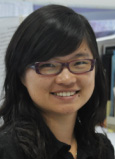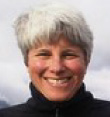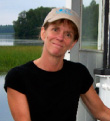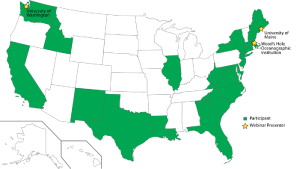|
|
 |
 |
 |
 |
|
|
|
| Network Topics |
|
| |  | | Wei "Vera" Shi |
COSEE China Visitor Wei "Vera" Shi, representing COSEE China from Xiamen University in Xiamen, China, is visiting the United States for the month of August. She will meet with several of the COSEE Centers in the Northeast. The focus of Vera's visit is to gain firsthand knowledge of COSEE Centers, to become familiar with marine science education in the US, and to learn more about developing education and outreach programs.
Vera became interested in COSEE during the March 2010 COSEE China Planning Workshop in Beijing, during which she met delegates from various COSEE Centers. She now works part-time for the COSEE China Office, which was initiated in 2010 and is directed by Drs. Minhan Dai, Wenqing Cao and Min Liu. Vera is also the Secretary for the State Key Laboratory of Marine Environmental Science (MEL), Xiamen University. At MEL she is responsible for international exchange programs (both institutional and individual) and organizing conferences, workshops, and seminars. She also coordinates outreach programs such as the joint program with Swire Taikoo (Xiamen) Aircraft Engineering Co. Ltd to increase public awareness of the ocean and environment.
During her trip to the US, Vera is being hosted by Dr. Fei Chai at the University of Maine. She will visit COSEE Ocean Systems, COSEE OCEAN, COSEE TEK, the School of Marine Sciences at the University of Maine, and Woods Hole Oceanographic Institution.
COSEE Online COSEE is working on expanding its online presence with the addition of a YouTube channel and Facebook page. |
|
|
| Working Group Updates |
|
Scientist Engagement Working Group The case study for Dr. Adina Paytan (University of California, COSEE California) has been approved and is posted on the COSEE Scientists Making an Impact website. The case study for Dr. Peggy Fong (University of California, COSEE West) is completed and will be in the approval process shortly, and the case study for Dr. Isaac Ginis (University of Rhode Island), COSEE National Office) is in development. The production team visited Dr. Joel Hoffman (Environmental Protection Agency, COSEE Great Lakes) in July. Please contact SEW-G Chair Jessie Kastler with questions, suggestions and comments (228-872--4269).
Web Working Group New this month for COSEE.net: a rotating set of images for our web background, provided by the NCO. Also new for the CMS: a table generator and buttons to like our pages to your Facebook page, tweet to Twitter, or send to a myriad of web platforms and other accounts (330 in all!). So like away and help us further expand our reach! For more information, contact Annette deCharon, WWG Chair.
ENTS Sub-Group ENTs is currently working on upgrading the Online Tools Guidebook and developing the next Network webinar. For more information, contact one of the ENTs co-chairs Catherine Cramer and Carla Companion.
Partnerships and Collaborations Working Group The Partnerships and Collaborations Working Group (PCWG) supports productive collaborations and connections between institutions, organizations and individuals involved in activities aligned with COSEE's mission and interests. The PCWG will:- Develop strategic partnerships to extend COSEE practices to reach additional ocean scientists (e.g., through professional societies)
- Identify opportunities within NSF (beyond OCE) and other federal agencies to extend COSEE practices or programs to other disciplines
- Develop quality partnerships that focus on underrepresented/underserved groups
- Work with the Institute for Broadening Participation in partnering with COSEE-OS to reach out to scientists and underrepresented groups
Members of the PCWG include Ivar Babb, Bob Chen, Sue Cook, Jan Hodder, Liesl Hotaling, and Gail Scowcroft. Please let members know if you are interested in joining the working group. |
|
|
| COSEE at Conferences |
|
USA Science and Engineering Festival Don’t miss COSEE at the largest celebration of science in the US! Explore science & engineering with 1500 free, hands-on activities and over 75 stage shows and author presentations. The two-day Expo is perfect for teens, children and their families, and anyone with a curious mind who is looking for a weekend of fun and discovery. USA Science & Engineering Festival Expo, Walter E. Washington Convention Center, Washington D.C, April 28-29, 2012.
COSEE at Ocean Sciences The COSEE Network will be well-represented with five sessions during the upcoming Ocean Sciences Meeting, February 20 – 24, 2012, Salt Lake City, Utah. If you have interest in submitting a paper or know of a colleague who would be interested, please contact the conveners of the session. (Abstracts due October 7, 2011)
COSEE: Using Evaluation to Measure the Impacts of Education/Outreach
- Patricia Kwon (COSEE West)
- Andrea Anderson (COSEE OLC)
- Diana Payne (COSEE TEK)
- Shawn Rowe (COSEE PP)
Using Data from Autonomous Vehicles and Drifters to Support Education and Outreach
- Janice McDonnell (COSEE NOW)
- Jim Yoder (COSEE NOW)
Science Communication Courses: Giving the Next Generation of Scientists a Voice
- Craig Strang (COSEE CA)
- Janice McDonnell (COSEE NOW)
- Eric Simms (COSEE CA)
International Education and Outreach Activities
- Adrienne Sponberg (COSEE OCEAN)
- Bob Chen (COSEE OCEAN)
- Melissa Ryan (COSEE TEK)
Improved Broader Impacts = Enhanced Scientific Impacts
- Gail Scowcroft (COSEE NCO)
- Liesl Hotaling (COSEE NOW, NCO)
AGU-NESTA The application form for a scientist/educator presenter team to participate in the AGU-NESTA Fall 2011 GIFT workshop is now available at AGU’s Education page (see the call box in the right column). The application form will be available until September 6, 2011. Please note that the GIFT workshop in being scheduled for December 5-6, 2011. If you have any questions about the workshop, please contact Pranoti Asher of AGU. |
|
|
| Announcements |
|
National Research Council Releases A Framework for K–12 Science Education The National Research Council (NRC) recently released its much-anticipated report that presents a new framework for K–12 science education and identifies the key concepts and practices that all students should learn. A Framework for K–12 Science Education offers a new vision for K–12 education in science and engineering, and represents a significant shift in how these subjects are viewed and taught.
According to the report, "K–12 science and engineering education should focus on a limited number of disciplinary core ideas and crosscutting concepts, be designed so that students continually build on and revise their knowledge and abilities over multiple years, and support the integration of such knowledge and abilities with the practices needed to engage in scientific inquiry and engineering design."
The framework will serve as the basis for the Next Generation Science Standards, a state-led effort managed by Achieve, Inc. The framework will also inform the work of curriculum and assessment developers, researchers, teacher educators, and others. |
|
|
|
|
| Center News |
| |  | | Robin Dublin |
COSEE Alaska welcomes its new Executive Director, Robin Dublin. Robin received her MS in environmental education from Lesley University, taught undergraduate and graduate courses at Columbia University, the University of Alaska and Alaska Pacific University. She ran Alaska Project WILD for 10 years and has received state and national recognition for excellence in environmental education.
COSEE Great Lakes Many activities are still happening in the Great Lakes region as partners step forward into leadership and extension of events begun with COSEE support in 2006-10.
| |  | | Cindy Hagley |
Cindy Hagley, Minnesota staffer for COSEE GL, received the Outstanding Educational Programming for Youth and Teachers Award at the Lake Superior Binational Forum’s annual Environmental Stewardship Awards Program in July. Hagley earned this recognition for her work with COSEE Great Lakes. This work encompassed helping to organize a highly successful youth symposium about Lake Superior and her skill at bringing scientists and educators together aboard the Environmental Protection Agency’s Research Vessel (RV), Lake Guardian.
COSEE GL Director Rosanne Fortner, Ohio staffer Lyndsey Manzo, and Ohio Sea Grant Associate Director Jill Jentes gave a presentation about Great Lakes Literacy Principles for NOAA’s Education Council on July 13. Presenters told how the principles and concepts were developed and gave examples of how they are already being used in formal and informal education. The NOAA audience was interested in establishing partnerships to extend use through partnerships with their offices.
Educator workshops are being offered in each Great Lakes state for dissemination of the Great Lakes Observing System [GLOS] data applications and specific lessons for “Teaching with Great Lakes Data.” Details and dates are found here.
The recent trip aboard RV Lake Guardian was documented on the EPA website.
COSEE OCEAN COSEE OCEAN just finished the first pilot of the Ocean Science Sequence (OSS) curriculum, in partnership with the Boston Public School (BPS) District. Developed by the Great Explorations In Math and Science (GEMS) group at the Lawrence Hall of Science (LHS), the OSS curriculum consists of three sequential units including: Unit 1-What Kind Of Place Is The Ocean?; Unit 2-What Is Life Like In The Ocean?; and Unit 3-How Are Humans And The Ocean Interconnected?
Seven highly gifted BPS teachers, working primarily in grade 5, received teacher training in early spring, and implemented the curriculum up through the end of June. Teachers were asked to comment on the time and pacing of the lessons; materials used to teach the lessons; students’ reactions to the lessons and materials; connections to the standards; and any other relevant general comments.
Through the feedback teachers provided on the pacing and timing of the units, the general consensus was that the time allotted for lesson plans is a little less than what actually is needed to complete many of the lessons as they are described in the teacher’s guide. Specifically, one teacher noted, “I am finding the discussions are taking a little more time than the estimated time given.” It was also noted that science specialists, having less flexibility, had to occasionally split a lesson over two days, whereas classroom teachers, having more flexibility in their schedules, were able to complete lessons in one day; but in many cases they also needed additional time.
When reviewing teacher feedback of the materials used in the kits, opinions varied depending on the lesson. Some cited difficulties quickly locating materials; however many felt that the materials enhanced students’ abilities to grasp concepts.
Teachers reported that student feedback has been fairly positive around the use of the instructional materials.
As we think of our next steps in the possible adoption of the OSS curriculum, we plan to take a closer look at all of the feedback collected from teachers in this initial pilot. Our review should help determine to what extent the OSS materials can serve the needs of students in the Boston Public Schools, how the materials align with the standards, and how they can potentially enhance or replace some of what is being taught in the scope and sequence of science in the Boston Public Schools. After completion of this evaluation the Boston Public Schools Science Department will determine if and how to expand the pilot into the 2011-2012 school year. The Boston Public Schools can be characterized as a large urban school district with ~80% underrepresented minorities and ~90% receiving free or reduced lunch. In this way, COSEE OCEAN is strongly addressing the need to broaden participation in ocean science education.
COSEE Ocean Learning Communities You can now access some of the session presentations from the June Improving Your Broader Impacts Workshop via the COSEE OLC home page.
COSEE OLC co-sponsored a teacher professional development workshop around the curriculum My Place in Puget Sound. This was the first step in scaling up the distribution of the COSEE OLC-catalyzed collaboration to bring data from the citizen science program SoundCitizen into secondary classrooms and informal settings. Educators workshopped about enacting place-based principles and strategies for empowering students to local action around environmental issues.
COSEE Ocean Systems Participants from twenty-one U.S. states and three countries (Canada, Iceland and Germany) tuned in for COSEE-OS's most recent webinar series. The five-part series featured scientists from the University of Maine, Wood's Hole Oceanographic Institution and the University of Washington involved with the North Atlantic Bloom Experiment.
 | Map of COSEE-OS NAB webinar participant locations |
Presenters worked with COSEE-OS staff to prepare related concept maps that they then populated with "assets" from their research and from the Ocean Climate Interactive database. The presentations were each followed by an explanation of a dataset prepared by the scientists and by Ivona Cetinic, a postdoc at the University of Maine. The five datasets produced for the webinar series follow the major themes of the presentation, and are designed to be used in inquiry-based lessons in the classroom. Each of the presentations are archived on the COSEE-OS webpage, and videos, concept maps and datasets can all be accessed here.
In contrast to "seminar style" webinars (where presenters have topics that may be unrelated to the previous webinar), this webinar series was designed to build on the knowledge gained each week. Webinar presenters frequently mentioned past webinar content, and used similar assets to reinforce the main ideas presented. Consequently, COSEE-OS found that this "mini-series" style webinar lead to a higher rate of returning attendees - with 64% of attendees returning for more than one webinar session in the series (compared to 24% of previous "seminar style" webinar series), and 10% attending all sessions in the series (compared to 2%).
COSEE TEK COSEE TEK recently held a Teacher Technology Experience Hiding in the Light (TTE), focusing on the optical properties of different habitats where fish and cephalopods camouflage, such as seagrass and seaweeds, and the biological response of vertebrate and invertebrate animals to the dynamic optical marine environment. Three teachers and one informal educator interacted with the lead scientist and graduate students to learn more about the properties of light in water, use of ocean optics instrumentation, participated in laboratory and field research, analyzed imagery and worked to develop lesson plans that link relative ocean science themes with K-12 curriculum standards.
COSEE West The NASA Jet Propulsion Lab and COSEE West are teaming up once again to bring you Climate Day, a free educational event for Middle and High school students and teachers, Thursday, October 13, 2011 Pasadena Convention Center, Conference Center (Lower Level). Visit the NASA website for details. |
| |
|
|
|
|
| Reports |
|
| STEM: Good Jobs Now and for the Future A new report released recently by the U.S. Department of Commerce on U.S. employment in the STEM fields finds that in 2010, 7.6 million people (5.5 percent of the labor force) worked in STEM occupations. Over the past 10 years, growth in STEM jobs was three times greater than that of non-STEM jobs, and STEM jobs are expected to continue to grow at a faster rate than other jobs in the coming decade. STEM workers are also less likely to experience joblessness. Further findings show STEM workers command higher wages, earning about 26 percent more than their non-STEM counterparts. STEM degree holders also enjoy higher earnings, regardless of whether they work in STEM or non-STEM occupations. Likewise, college graduates—no matter what their major—enjoy an earnings premium for having a STEM job. Read the report STEM: Good Jobs Now and for the Future (PDF). |
|
|
|
|
Contribute to CNN! Send news and announcements of interest to the COSEE Network community to the editor, Catherine Cramer.
|
|
|
|
|
| COSEE Centers and Council Representatives |
|
| COSEE Alaska (Nora Deans, North Pacific Research Board) |
| COSEE California (Craig Strang, UC Berkeley) |
| COSEE Central Gulf of Mexico (Sharon Walker, Institute for Marine Mammal Studies) |
| COSEE Coastal Trends (Laura Murray, U of Maryland Center for Environmental Science) |
| COSEE Florida (Edwin Massey, Indian River State College) |
| COSEE Great Lakes (Rosanne Fortner, Ohio State University) |
| COSEE Networked Ocean World World (Janice McDonnell, Rutgers University) |
| COSEE OCEAN (Bob Chen, University of Massachusetts) |
| COSEE Ocean Learning Communities (Phil Bell, University of Washington) |
| COSEE Ocean Systems (Annette deCharon, Darling Marine Center, University of Maine) |
| COSEE Pacific Partnerships (Jan Hodder, Oregon Institute of Marine Biology) |
| COSEE SouthEast (Lundie Spence, South Carolina Sea Grant Consortium) |
| COSEE TEK (Ivar Babb, University of Connecticut) |
| COSEE West (Linda Duguay, University of Southern California) |
|
|
 |
 |
 |
 |
|
 |
|

